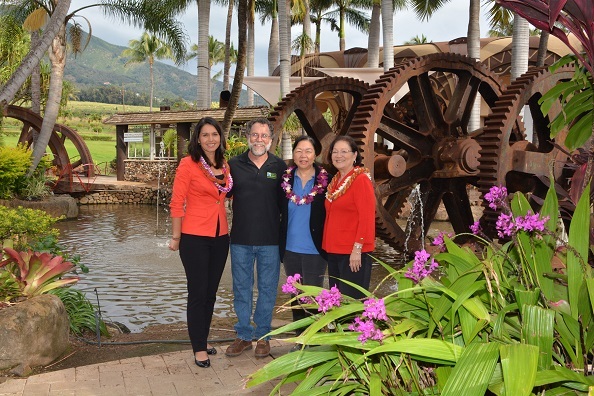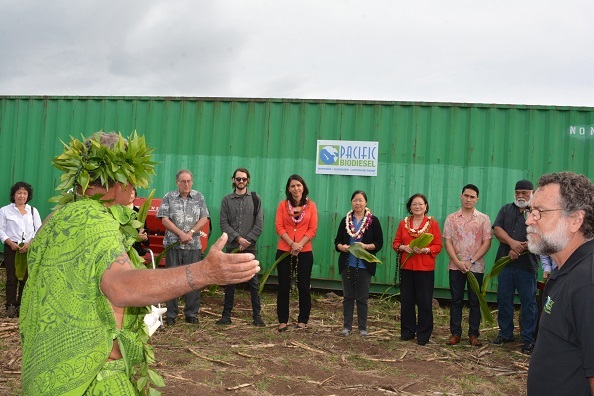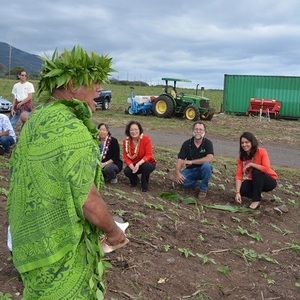Pacific Biodiesel launches Hawaii's largest biofuel crop project




Photo: Pacific Biodiesel
February 27, 2017
BY Pacific Biodiesel
Pacific Biodiesel Technologies hosted a Hawaiian blessing Feb. 24 to mark the beginning of the company’s scaled-up farming demonstration to grow biofuel crops including sunflowers in Maui's central valley. The initial crop project on 115 acres will expand diversified agriculture by growing combine-harvested oil crops on land previously used for sugar cane production. This is the largest biofuel crop project in the state of Hawaii and the only biofuel farming operation in the state running on 100 percent renewable fuel, showcasing the company’s sustainable, community-based model of agriculture and renewable energy.
Bob and Kelly King, founders of Pacific Biodiesel, were joined by invited guests, including project stakeholders, local farmers, legislators and other community supporters for a Hawaiian blessing on the crop site led by Kimokeo Kapahulehua. In attendance were U.S. Sen. Mazie Hirono and U.S. Rep. Tulsi Gabbard who each provided remarks in support of this largest biofuel crop project in the state.
Advertisement
Advertisement
“We’re designing a sustainable, zero-waste and economically viable system to grow food, animal feed and fuel,” said Pacific Biodiesel President Bob King. “Short-term crops that harvest in 100 days or less can be planted, harvested, crushed and converted to biodiesel, all in Hawaii. We’re focusing on several different crops in various crop rotations and experimenting with different soil amendments such as compost and others made from byproducts of the production of our biodiesel, like glycerin and potassium sulfate.”
Pacific Biodiesel is planting sunflowers as its first biofuel crop on Maui, applying the knowledge learned from its past experience and partnership with the U.S. military as part of the Hawaii Military Biofuels Crop Program that demonstrated the planting, growing and processing of biodiesel feedstocks on Oahu and Hawaii island.
Advertisement
Advertisement
An eye-catching symbol of sustainability, acres of sunflowers can provide a solution for energy security while they sequester carbon from the atmosphere. “Think of it as 100-plus acres of energy storage and carbon sequestration,” said Kelly King, Vice President and Co-Founder of Pacific Biodiesel and recently inaugurated member of the Maui County Council. “There are 36,000 acres of fertile sugar cane lands on Maui that ceased operation at the end of 2016. It is important for the community and the state to keep this land in agriculture to benefit Maui’s economy and environment, and to help the state increase its energy security, reduce reliance on fossil fuel, and achieve its 100 percent renewable energy mandate by 2045.”
The company is committed to continuing its collaboration with local farmers and landowners. “We are looking forward to working with our farming neighbors, Kumu Farms and Hoaloha as well as other farmers at the Maui Tropical Plantation and in the community,” King said. “Our growth and success has always been rooted in collaboration and innovation.”
Based on Pacific Biodiesel’s experience growing sunflowers, the company expects an initial yield of 100-plus gallons of oil per acre per harvest, with up to three harvests per year possible. With first seeds planted in February, the company looks forward to initial sunflower blooms by Earth Day (April 22), which coincides with the first anniversary of Pacific Biodiesel becoming the world’s first biodiesel producer certified by the Sustainable Biodiesel Alliance. Plans are in development for a community event to share these first sunflower blooms.
Related Stories
The USDA significantly increased its estimate for 2025-’26 soybean oil use in biofuel production in its latest World Agricultural Supply and Demand Estimates report, released July 11. The outlook for soybean production was revised down.
U.S. fuel ethanol capacity fell slightly in April, while biodiesel and renewable diesel capacity held steady, according to data released by the U.S. EIA on June 30. Feedstock consumption was down when compared to the previous month.
The U.S. EPA on July 8 hosted virtual public hearing to gather input on the agency’s recently released proposed rule to set 2026 and 2027 RFS RVOs. Members of the biofuel industry were among those to offer testimony during the event.
The USDA’s Risk Management Agency is implementing multiple changes to the Camelina pilot insurance program for the 2026 and succeeding crop years. The changes will expand coverage options and provide greater flexibility for producers.
The USDA’s National Agricultural Statistics Service on June 30 released its annual Acreage report, estimating that 83.4 million acres of soybeans have been planted in the U.S. this year, down 4% when compared to 2024.
Upcoming Events










